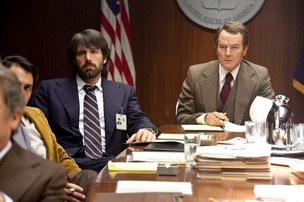
For shame, chant the critics, Argo plays too fast with the past.
One of the great regrets about being a historian is the lack of a glittering annual awards ceremony, where leading practitioners get to dress up in evening gowns, be fawned over by an adoring public and string together a few short but inane sentences to thank the neighbours’ cat before bursting into tears.
But we should, I think, cut Hollywood some slack. It is easy to forget that history is all about dramatic license. Who wants to read a boring account of the past? Which historian does not want to spice things up? And even as far as flaws, errors and distortions go – well, bring them on. Historians revel in them as cinema-goers revel in their tubs of popcorn: our job is to find the problems and mistakes in Herodotus, to tear up the textbooks about the Crusades by showing why received opinions are wrong, to challenge accepted views about the decline of the British empire – and to re-assess the past by working out who got things wrong.
As a historian, while twisting things on purpose can hardly get two thumbs up, I can't begrudge Argo. After all, the principle of shaping a story to move it along is one the film shares with many of the great histories of the past that do exactly the same thing. Try telling Arrian that it was not one tribe but another who got in Alexander the Great's way as he crossed central Asia or that he missed a bit out; or Gibbon that his assessment of the Byzantine empire as degenerate was not just unfair but flat wrong; or modern commentators in United States that their views about the Middle East, the Arab spring and contemporary Russia are poorly informed and riddled with misunderstandings. It happens.
While I never thought I'd say it (especially after the 'Bennifer' debacle – and double especially after being forced by my children to watch the giant turkey that is Pearl Harbour recently), I’m with Ben Affleck on this one. The story he tells in Argo may not be spot on. But then again, history has a funny tendency not to be: facts get in the way of a good story surprisingly often.
Much more interesting than Affleck-bashing is why there is a swell of feel-good for a triumph over adversity story involving US policy in Iran right now, and why Argo had a resonance that played so well with the Academy. Something to do, perhaps, with supporting the American intelligence agencies in part of the world where we all fear the future, and with the insecurities about the pressures on the west in a changing world: Argo is, after all, nothing if not a classic ‘get in the lifeboat story’, a tale of salvation from the jaws of disaster.
In that sense, Argo should not be judged on whether it is historically reliable; it should be understood as a morality tale which tells us who the good guys are (USA/CIA) and who the bad guys are (Iran, who else), and does not need to bother about anyone else (e.g. the Brits).
So a bit like The Odyssey, then, albeit perhaps not quite as profound (despite the Best Movie) – and I’m not sure Odysseus would be flattered with the comparison to Ben Affleck (despite his luxuriant hair). Both, after all, were entertainment – rather than great works of history.
Now, about my Tom Ford tuxedo for the historians’ award ceremony. And the nominees are….
 RSS Feed
RSS Feed